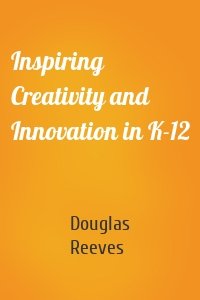Douglas Reeves
6 кн.
Myth of the Muse, The
Creativity is crucial in helping students achieve academic and professional success. The authors argue that creativity is not spontaneous or inborn but a process that can be cultivated by utilizing seven “virtues” that inspire creativity: curiosity, versatility, synthesis, discipline, collaboration, experimentation, and tenacity. Ideal for team study and discussion, the book includes assessment rubrics as well as sample activities and practical guidelines to encourage and...
| Автор | Douglas Reeves |
Elements of Grading
Formative assessment plays an important role in increasing teacher quality and student learning when it’s viewed as a process rather than a tool. Emphasizing the instructional side of formative assessment, this book explores in depth the use of classroom questioning, learning intentions and success criteria, feedback, collaborative and cooperative learning, and self-regulated learning to engineer effective learning environments for students.
| Автор | Douglas Reeves |
Inspiring Creativity and Innovation...
Encourage a culture of innovation and creativity. Innovation and creativity are imperative to educational success and require the contributions of teachers, students, administrators, and policymakers. Explore the four essentials for developing a creative, mistake-tolerant culture; investigate teaching and leadership beliefs and practices that undermine creativity; and discover strategies for successfully navigating challenges that your team may face along the way.
| Автор | Douglas Reeves |
Achieving Equity and Excellence
Achieve high performance for all in your school. In Achieving Equity and Excellence , author Douglas Reeves outlines how to make dramatic improvements to student learning, behavior, and attendance in a single semester. Study the mindset of high-poverty, high-success schools and follow their example to implement the equitable and just practices necessary to make student success a sustainable reality. Use this resource to empower students, teachers, and administrators: Study the landmark...
| Автор | Douglas Reeves |
FAST Grading
Embrace effective grading procedures that have the power to reduce failure rates, improve student discipline, encourage learning, and enhance morale. In this three-part guide, the author presents practical strategies teachers and administrators can use to ensure their grading practices center on four essential criteria: fairness, accuracy, specificity, and timeliness. Apply case studies, real-world feedback models, and interactive reflection questions gain support for grading reform, navigate...
| Автор | Douglas Reeves |
From Leading to Succeeding
Utilizing the crucial elements of effective leadership—purpose, trust, focus, leverage, feedback, change, and sustainability—education leaders can overcome the many challenges they face in their profession and learn the skills and characteristics they need to succeed. This book synthesizes research from 21st century sources and confronts prevalent leadership myths, while offering guidance on best leadership practices. Use this professional development tool to establish a...
| Автор | Douglas Reeves |







